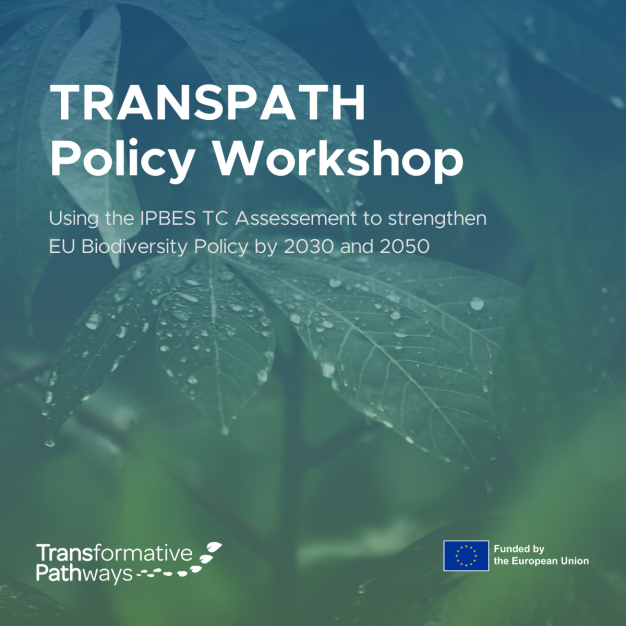
TRANSPATH Workshop on Transformative Change
Background and Context
The TRANSPATH project explores pathways for transformative change in biodiversity and climate governance, focusing on long-term strategies to integrate sustainability into policies and practices. As part of this mission, TRANSPATH is organising a workshop, this April 2025 in Brussels, that will discuss key findings from the IPBES Transformative Change Assessment Report, a comprehensive report that examines the drivers of biodiversity loss and the systemic changes needed to address them.
This assessment, developed by 101 experts from 42 nations, draws from over 7,000 references, including indigenous and local knowledge, to provide evidence-based options for transitioning towards a sustainable world.
Key Findings of the Assessment
The Need for Systemic Change
A fundamental reorganisation of the relationships between technology, economy, and society is crucial to tackling biodiversity loss. Current economic models prioritise short-term individual gains, leading to a continued disconnect between humans and nature.
Underlying Causes of Biodiversity Loss
The report identifies five key challenges that drive biodiversity loss
The issue of biodiversity loss is driven by five key challenges that intertwine economic, political, and social factors. Firstly, prevailing relations over nature and people are often dominated by economic and political structures that exploit natural resources for short-term gains. This is compounded by significant economic and political inequalities, where a disproportionate number of individuals and communities have access to benefits and decision-making power, leaving many without a voice in critical environmental matters.
Furthermore, the inadequacy of policies and the presence of unfit institutions lead to weak governance frameworks that cannot adequately address or rectify systemic issues related to biodiversity. Moreover, unsustainable consumption and production patterns exacerbate the situation, as we see the overexploitation of natural resources surpassing ecological limits. Finally, there is a notable barrier in the limited access to clean technologies, which hinders the widespread adoption of sustainable innovations that could mitigate these challenges. Collectively, these factors create a complex landscape that continues to threaten biodiversity across the globe.
Strategies for Transformative Change
The assessment outlines five interlinked strategies, each requiring coordinated action. Firstly, sustainable stewardship involves engaging indigenous peoples and local communities in conservation efforts. Secondly, transformative sectoral changes focus on high-impact sectors such as agriculture, forestry, and mining. Thirdly, economic restructuring emphasises a shift towards sustainable economic paradigms. Inclusive governance ensures participatory decision-making that reflects diverse voices. Lastly, a shift in societal values encourages the recognition of human-nature interdependencies.
Mapping TRANSPATH to Transformative Change Strategies
The TRANSPATH workshop will explore three key strategies for transformative change: transforming economic systems, governance systems, and societal values. These strategies provide a framework for understanding how biodiversity and climate policies can drive systemic change.
Transforming economic systems for nature and equity involves identifying leverage points that shift economic paradigms toward biodiversity-positive outcomes. The project examines the socio-economic and environmental impacts of different transformative pathways and explores interventions in trade regulation, the financial sector, and sustainable value chains to support this transition.
Transforming governance systems focuses on multi-actor engagement, rights-based approaches, and governance structures that enable systemic change. By fostering more integrated, inclusive, accountable, and adaptive institutions, TRANSPATH seeks to support long-term biodiversity and climate goals through effective policy and decision-making.
Shifting societal values is essential for embedding sustainability into policy and practice. The project explores how cultural contexts, knowledge systems, and perceptions of human-nature interconnections influence transformative change. Recognizing these values helps design interventions that are both socially and ecologically responsive.
The workshop will examine how these strategies can shape future biodiversity and climate policies, with a focus on economic and governance reforms alongside value shifts needed for lasting transformation. A full report on the workshop discussions will be available on the TRANSPATH website in early May 2025—stay tuned for insights and key takeaways.